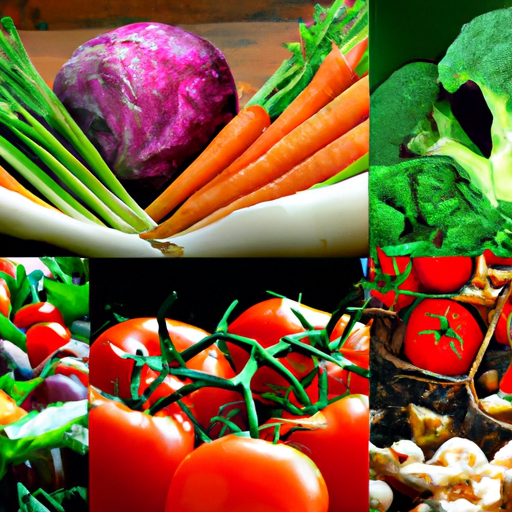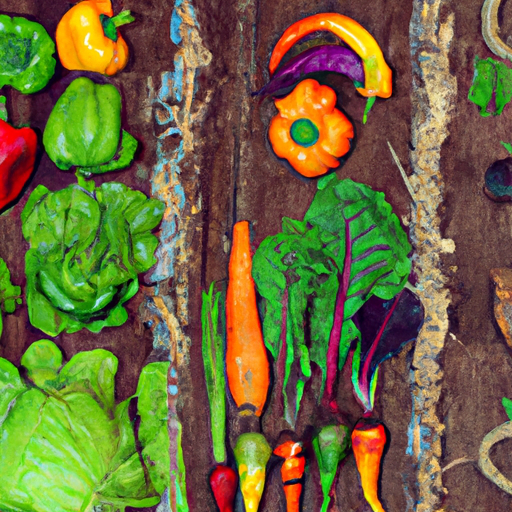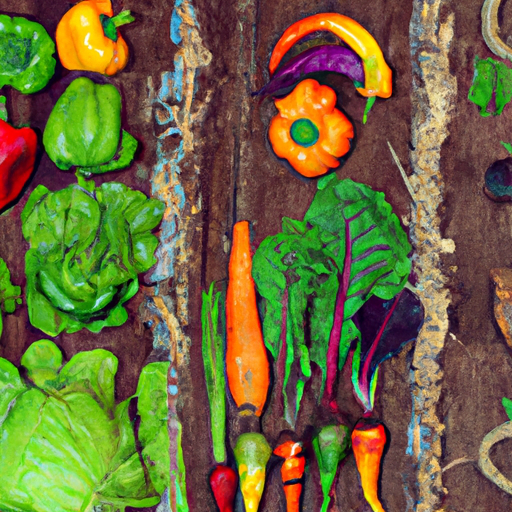So, have you ever wondered what exactly are grow foods rich in nutrients? You know, those foods that are packed with all the good stuff that your body needs to thrive? Well, you’re in luck because today we’re going to dive into the wonderful world of grow foods and what makes them so nutrient-rich.
When we talk about grow foods, we’re referring to fruits and vegetables that are bursting with vitamins, minerals, and antioxidants. These are the foods that give our bodies the fuel they need to function at their best. They’re also packed with fiber, which is essential for a healthy digestive system. In short, grow foods are like little powerhouses of nutrition that can have a big impact on our overall health and well-being.
In our upcoming article, we’ll be exploring some of the specific grow foods that are particularly rich in nutrients. We’ll delve into the benefits of leafy greens like spinach and kale, the vitamin C powerhouse that is citrus fruit, and the antioxidant-rich berries that can help protect our cells from damage. We’ll also discuss how incorporating these grow foods into our diets can support our immune systems, improve our digestion, and boost our energy levels.
So, if you’re curious about the wonders of grow foods and how they can benefit your health, stay tuned for our upcoming article. You’ll learn all about the different types of grow foods, their nutritional profiles, and some delicious ways to incorporate them into your meals. Trust us, after reading this, you’ll be ready to fill your plate with these nutrient-rich goodies and reap all the rewards they have to offer.

Introduction
Eating a healthy diet is essential for maintaining good health and overall well-being. One key component of a healthy diet is the consumption of grow foods, which are rich in nutrients. Grow foods play a crucial role in ensuring optimal growth and development, boosting energy levels, strengthening the immune system, and supporting cognitive function. In this article, we will explore the definition of grow foods, the nutrients they contain, their sources, the benefits they offer, recommended daily intake, tips for incorporating them into your diet, potential risks of poor nutrition, and tips for choosing and storing grow foods.
Definition of Grow Foods
What are Grow Foods?
Grow foods, also known as nutrient-dense foods, are natural, whole foods that are packed with essential nutrients, including proteins, vitamins, and minerals. These foods provide the body with the necessary fuel it needs to function properly and support overall growth and development.
Importance of Grow Foods in a Healthy Diet
Grow foods hold significant importance in a healthy diet. They are essential for maintaining a balanced intake of nutrients, which is vital for optimal health. By consuming grow foods, you can ensure that your body receives the necessary nutrients it requires for various functions, such as energy production, tissue repair, immune system support, and cognitive function.
Nutrients in Grow Foods
Introduction to Nutrients
Grow foods contain a wide range of nutrients, each serving a specific purpose in the body. Some of the key nutrients found in grow foods include proteins, vitamins, and minerals.
Protein-Rich Grow Foods
Proteins are the building blocks of our body. They play a crucial role in tissue repair, muscle development, and overall growth. Grow foods that are rich in protein include lean meats, poultry, fish, dairy products, legumes, nuts, and seeds.
Vitamin-Rich Grow Foods
Vitamins are essential for maintaining optimal health and preventing various diseases. Grow foods that are rich in vitamins include fruits, vegetables, whole grains, nuts, and seeds. Different fruits and vegetables provide different vitamins, so it is essential to include a variety of them in your diet.
Mineral-Rich Grow Foods
Minerals are necessary for various bodily functions, including bone health, immune system support, and nerve function. Grow foods that are rich in minerals include leafy greens, dairy products, nuts, seeds, whole grains, and seafood.

Sources of Grow Foods
Plant-Based Sources
Plant-based sources of grow foods include fruits, vegetables, legumes, whole grains, nuts, and seeds. These foods provide a wide range of essential nutrients and are often rich in antioxidants, fiber, and phytochemicals. They are also naturally low in saturated fats and cholesterol, making them a healthy choice for overall well-being.
Animal-Based Sources
Animal-based sources of grow foods include lean meats, poultry, fish, dairy products, and eggs. These foods are excellent sources of high-quality proteins, vitamins, and minerals. However, it is important to choose lean cuts of meat and low-fat dairy products to ensure a healthy balance of nutrients and to avoid excessive intake of saturated fats.
Combination of Plant and Animal-Based Sources
Combining plant-based and animal-based sources of grow foods in your diet can provide a well-rounded intake of essential nutrients. By incorporating a variety of fruits, vegetables, legumes, whole grains, lean meats, poultry, fish, dairy products, and eggs, you can ensure that you are getting a balanced mix of proteins, vitamins, and minerals.
Benefits of Grow Foods
Promote Healthy Growth and Development
Grow foods are essential for promoting healthy growth and development, especially in children and teenagers. The proteins, vitamins, and minerals found in grow foods contribute to the formation of bones, muscles, and tissues, ensuring proper physical development.
Boost Energy Levels
Grow foods are a great source of energy. The carbohydrates and proteins found in these foods provide the necessary fuel to keep you energized throughout the day. By incorporating grow foods into your diet, you can maintain stable energy levels, which can help improve productivity and overall well-being.
Strengthen Immune System
The vitamins and minerals found in grow foods play a vital role in supporting a strong immune system. By consuming a variety of fruits, vegetables, lean meats, and dairy products, you can ensure that your body receives the necessary nutrients to fight off infections and diseases.
Support Cognitive Function
Certain nutrients, such as omega-3 fatty acids, found in grow foods contribute to optimal brain function. Consuming foods rich in omega-3 fatty acids, such as fatty fish, can support cognitive function, memory, and overall brain health.
Recommended Daily Intake of Grow Foods
Age and Gender-Specific Recommendations
The recommended daily intake of grow foods varies depending on age, gender, and activity level. Generally, it is recommended to consume a balanced diet that includes a variety of grow foods to meet your nutrient requirements. Consulting with a healthcare professional or registered dietitian can provide personalized recommendations based on your specific needs.
Factors Influencing Daily Intake
Several factors can influence the daily intake of grow foods, including individual nutrient requirements, age, gender, activity level, and overall health status. It is important to consider these factors when planning your meals and ensuring that you are consuming a balanced intake of essential nutrients.
Incorporating Grow Foods into Your Diet
Meal Planning
Meal planning is an effective way to incorporate grow foods into your diet. Plan your meals in advance, ensuring that you include a variety of fruits, vegetables, lean proteins, whole grains, and dairy products. This will help you meet your nutrient requirements and create a well-balanced meal plan.
Recipe Ideas
There are countless recipe ideas available that feature grow foods. Experiment with different fruits, vegetables, lean meats, and whole grains to create delicious and nutritious meals. Incorporate spices and herbs to enhance the flavors of your dishes, making them even more enjoyable.
Snack Ideas
Snacks can also be an opportunity to include grow foods in your diet. Opt for snacks such as fresh fruits, vegetables with hummus, Greek yogurt, nuts, or seeds. These options provide essential nutrients and can help curb cravings throughout the day.
Potential Risks of Poor Nutrition
Malnutrition
Poor nutrition can lead to malnutrition, which occurs when the body does not receive an adequate amount of essential nutrients. Malnutrition can result in various health problems, including weakened immune system, stunted growth, and impaired cognitive function.
Deficiency Diseases
Deficiency diseases can occur when the body lacks specific nutrients. For example, a deficiency of vitamin C can lead to scurvy, while a deficiency of vitamin D can result in rickets. Including a variety of grow foods in your diet can help prevent these deficiency diseases.
Tips for Choosing and Storing Grow Foods
Selecting Fresh and High-Quality Produce
When choosing fruits and vegetables, look for ones that are firm, vibrant in color, and free from bruises or blemishes. Selecting high-quality produce ensures that you are getting the maximum nutritional benefits from these grow foods.
Proper Storage Techniques
Proper storage of grow foods helps preserve their nutrients and extends their shelf life. Store perishable items, such as fruits and vegetables, in the refrigerator, while dry goods like nuts, seeds, and whole grains can be kept in a cool, dry place in sealed containers to maintain their freshness and nutritional value.
Conclusion
Grow foods rich in nutrients are essential for maintaining a healthy diet and overall well-being. They provide the body with vital proteins, vitamins, and minerals that support growth and development, boost energy levels, strengthen the immune system, and support cognitive function. By incorporating a variety of grow foods into your diet, planning your meals, and choosing and storing them correctly, you can ensure that you are getting the necessary nutrients to lead a healthy and fulfilling life. Remember, your health is in your hands, so make the right choices and prioritize the inclusion of grow foods in your diet.




